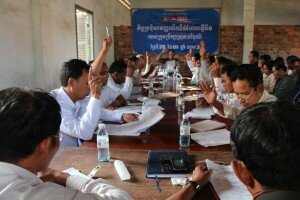 11 November 2015
11 November 2015
The National Committee for Sub-national Democratic Development (NCDD), which is responsible for the decentralization reform in Cambodia, adopted the District/Municipal Charter (DM Charter) during its meeting in August. Its goal is to strengthen district and municipal councils and to improve the performance of their administrations.
The DM Charter summarizes what is already ordained in the “Law on Administrative Management of Capital, Provinces, Municipalities, Districts and Khans” and other legislation: councils are autonomous bodies. They are responsible for the development of their constituencies, and therefore must take the interests and needs of their citizens into account, and involve them in their decision-making processes. Councils have legislative and executive powers, so governors must accept and implement their decisions.
But the reality in the districts and municipalities has been otherwise. Many councillors are not yet aware of their responsibilities and their far-reaching powers. Many governors find it difficult to hand over decision-making powers to the councils. The DM Charter, which was developed with support from the EU-SPACE program (Strengthening Performance, Accountability, and Civic Engagement) implemented by GIZ, is intended to change that. It aims to bolster the councils and to encourage them to contribute in a more active manner to the development of their jurisdiction than in the past. At the same time, the DM Charter should be used to inform the people about the roles and responsibilities of the sub-national administration.
The currently available DM Charter is a template, i.e. it serves as the basis for the districts and municipalities to develop a charter that fits their specific situation and needs. The NCDD hopes that it will now be intensively discussed in all district and municipal administrations, with the commune and sangkat councils, as well as with the citizens in the area of the respective council. The NCDD specifically emphasizes that the councils have the right to change the draft DM Charter to meet their needs. During a consultative workshop in Phnom Penh, H.E. Sak Setha, Secretary of State and Head of NCDD Secretariat, encouraged the participating key actors: “All Districts and Municipalities shall prepare their own DM Charter.”
Following discussions with the citizens and all key stakeholders, the district and municipal councils should adopt the DM Charter as a local law (DEIKA). The DM Charter will thereby become legally binding for all actors within the district and municipal administrations.

